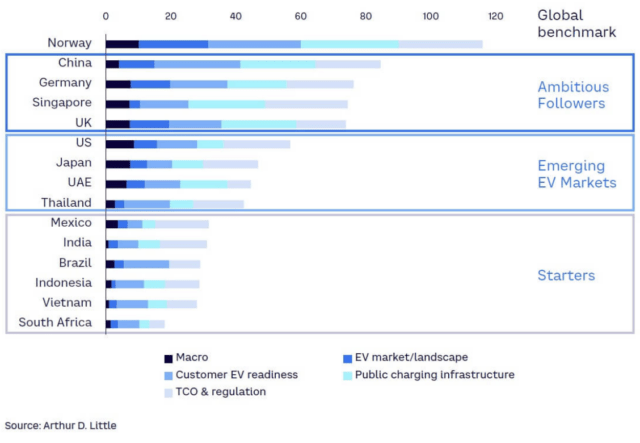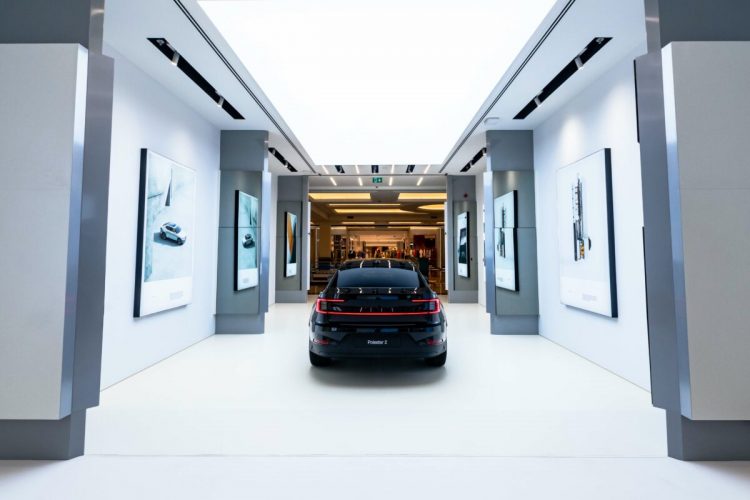If you’ve strolled through Mall of The Emirates in Dubai in the last six months, a shiny new store just across from Harvey Nichols may have caught your eye. Looking like a cross between an art gallery and an Apple Store, there’s just one product for sale inside. The fact that it’s an electric car says everything about the status of — and excitement surrounding — electric vehicles in the UAE as we enter 2023.
This new take on automotive retail is the brainchild of Polestar, the Swedish electric performance car brand, and their UAE partner Al-Futtaim Automotive. And it feels perfectly judged; for electric cars to capture the imagination, the whole experience of purchasing them has to feel special, exciting, and yes, guilt-free, given their sustainability credentials.
Take a no-pressure look around the Polestar 2, with its “uncompromising, minimalistic, detail-oriented approach to design and advanced, industry-leading technologies”, as Vincent Wijnen, senior managing director of Al-Futtaim Automotive puts it — and the story of this premium Scandinavian EV brand’s entry into the UAE market feels compelling. It genuinely feels like a unique shopping experience tailored to each visitor. The days of trawling round slightly shabby car showrooms seem archaic.
You’d expect Wijnen to be excited, but he has the stats to back it up.
“We have seen massive success for the Polestar 2 since its launch,” he confirms. “Our order book is full, which clearly shows the UAE’s interest in EVs, and we will increase our stock levels in 2023 to meet customer demand.”
And it does feel like 2022 was a formative year in the fortunes of EVs in the UAE. Alongside Polestar, Al-Futtaim also work with Toyota, Lexus and Volvo, so they’re perfectly placed to understand this market. Wijnen cites a number of factors in the obvious transformation of green mobility in the UAE.
The upward curve in petrol and diesel prices has made the cost of charging an electric vehicle a much more compelling buying decision. Add that to the fact that EVs, with fewer moving parts, are far cheaper to repair and maintain — no tricky internal combustion engines to consider, no oil or filter changes to think about — and there’s also a lower long term cost of ownership.

Interestingly — and encouragingly — Wijnen says they are also finding customers have a “growing awareness of the dangers of climate change, convincing many to seek alternative modes of transport”. He refers to a recent Digital Life Index report by Publicis Sapient, a digital business transformation company.
“It revealed 82 per cent of potential buyers in UAE would consider an EV, rising to 90 per cent for a hybrid, showing there is clear market demand for this shift towards sustainable automotive technology.”
And it’s not just cool new high performance EVs humming down Sheikh Zayed Road driving this interest. It’s also the greater degree of confidence in the technology — and the infrastructure — to power these cars. Doubts around batteries and ranges are becoming less and less important in buying decisions; Polestar 2 not only has a battery warranty of up to eight years or 160,000km, but on a full charge could get you from Mall of The Emirates in Dubai to Abu Dhabi’s Yas Mall and back again, nearly three times. It feels like the conversation is now less ‘why would you buy an EV’ and more ‘why wouldn’t you?’ Wijnen agrees.
“Thanks to strong leadership and initiatives from the government, the UAE’s infrastructure currently supports the increasing EV technology sector and is growing exponentially,” he says.
“The Dubai Green Mobility Strategy saw over 500 EV chargers installed across the emirate this time last year, with further initiatives designed to encourage the uptake of EVs, HEVs and PHEVs. Last month, the government of Abu Dhabi launched its regulatory policy for EV charging infrastructure, which will drive investments into EV charging infrastructure in Abu Dhabi and encourage consumers to purchase and use EVs.”
He’s right that the infrastructure has ramped up this year. In June, the UAE Ministry of Energy and Infrastructure said it would deploy Siemens’ ultra-fast chargers on the highways in Ras Al Khaimah, Ajman, Umm Al Quwain and Fujairah, in a collaboration with Audi, that will add further to the EV charging landscape. DEWA are planning over 1,000 EV chargers by 2025, too.
Lots of supportive words and impressive plans, then, but in reality how EV-friendly is the UAE at the end of 2022? There is actually a measure for this: the Global Electric Mobility Readiness Index (GEMRIX) from business consulting firm Arthur D Little. Norway leads in EV adoption, and next come what the report calls Ambitious Followers, countries where all prerequisites for EV mobility are in place and EVs are on the verge of becoming mainstream. China, Germany, UK and Singapore are in that grouping. But following those countries come the Emerging EV markets; US, Japan, Thailand, and UAE. Places where EVs lag the internal combustion engine (ICE), but customers are becoming more comfortable with the idea as infrastructure is ramping up.
So that’s encouraging. Add in the flexibility that electric car production offers, being easier to design and build. M Glory’s October opening of their 45,000 square foot Al Damani Electric Vehicle factory in Dubai Industrial City was another expression of how the picture of UAE mobility is quickly changing. They hope to build 10,000 of their DMV300 cars now and 55,000 when they’re up to full speed. Meanwhile, just last month, Saudi Arabia’s Ceer signed a US$96 million land purchase deal with Emaar to build its own range of EVs, ready to roll off their new production line in 2025.
In the here and now, though, Al-Futtaim Automotive is one company focused on working with established EV brands, with management convinced that doing so will make big changes to the way we power our transport.
“Driven by the UAE’s vision for sustainable development and the UAE National Smart Mobility strategy, Al-Futtaim Automotive will continue to be a pioneering force in making mobility sustainable,” promises Wijnen.
Looking at the EV landscape going into 2023, you have to believe him.


